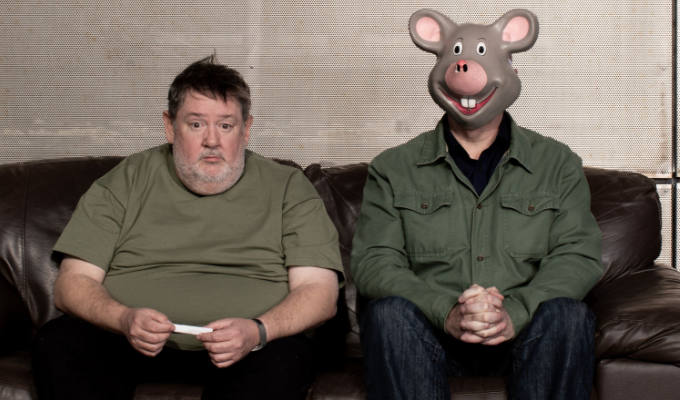A law unto themselves
How comedians deal with joke copyright
Comedians have formed their own system for dealing with joke thieves that can be far more effective than any formal copyright law, an academic paper has concluded.The stigma of being accused of stealing material proves a powerful deterrent against plagiarism, the study found, with the tight-knit stand-up community proving efficient at policing itself.
University of Virginia law professors Chris Sprigman and Dotan Oliar decided to investigate gag theft after seeing the YouTube video in which comic Joe Rogan squared up to Carlos Mencia on stage, accusing him pilfering material from other comedians.
They found that there was little effective legal protection against joke theft – but that social norms among comedians ‘substitute for intellectual property law’ and provide tough sanctions against those who break the unwritten code.
The pair could find no case of one stand-up suing another over copyright, ‘despite what appears to be a persistent practice of joke stealing’. They believe that comics are put off by the possible cost of such action, the chances of success and the fact that damages they could win from a comic with few assets may be small.
One problem faced by a potential litigant is that the law protects the expression of ideas, but not the ideas themselves. So a joke rewritten with different words, but the same core idea, might not be seen as a breach of copyright. Another difficulty would be proving the material was copied, and not just a coincidence that two similar routines had been created independently.
However, the professors said that the world of stand-up had developed its own system of protection that worked outside the law, and ensured that it remained in comedians’ best interest to go to through the difficult process of writing new material, rather than lifting it from others.
In their paper, published in the December edition of the Virginia Law Review, they said: ‘What emerged from our interviews instead was evidence of a system of norms that works as an informal but nonetheless significant constraint on appropriation of comedians’ material.’
They found that more than 90 per cent of disputes over material were settled amicably and informally. In most cases, the two comics concerned would determine between themselves whether the material was copied, possibly subconsciously, or generated independently, and consider who was performing the joke first. They would then come to an agreement on who should perform the joke, or simply decide not to do the joke if they are on the same bill.
The professors even found evidence of some comedy clubs using a light to signal to the act on stage when a reputed joke thief was in the room, so they could switch to old material or ad-lib with the crowd and protect their best gags.
‘We just heard over and over again that the bad-mouthing sanction was something that created an unpleasant environment for the accused comic to be in,’ Sprigman said on the University of Virginia website.
But when negotiation doesn’t work, the shame of being accused of a joke-stealer in the small world of stand-up acts as a deterrent. Comedians can make life uncomfortable with alleged thieves, and sometimes will refuse to appear on the same bill, costing the transgressor work.
Their paper concluded: ‘Taken as a whole, this norms system governs a wide array of issues that generally parallel those ordered by copyright law … enforced with sanctions that start with simple badmouthing and may escalate from refusals to work with an offending comedian up to threats of, and even actual, physical violence.
‘These sanctions, while extra-legal, can cause serious reputational harm to an alleged joke-thief, and may substantially hamper a showbiz career. Hence norms-based sanctions deter joke-stealing. ’
Sprigman said: ‘The most salient observation is that the law has not done the job of protecting jokes, but the joke market has not failed. The market is substituting this set of informal rules for the formal ones, and as far as we can see it’s doing a pretty good job.’
But he did concede: ‘If a successful comedian doesn’t care too much about the community’s feelings toward him, then he’s hard to discipline. But keep in mind that the formal law doesn’t always work either.’
Click here to download the full paper.
Here’s the video of the Mencia-Rogan confrontation:
And another example of Mencia performing similar material to another comic:
Published: 5 Jan 2009






